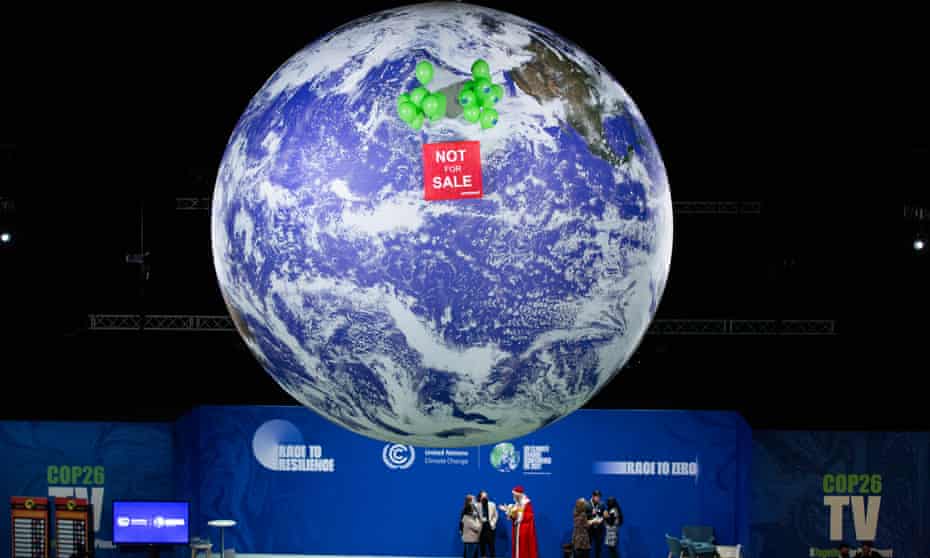The Observer view on the Cop26 agreement
Countries still lack the radical ambition to avert disaster – this accord goes nowhere near far enough

Just over a quarter of a millennium later, delegates from all over the world meeting in the same city have agreed the text of a critical international agreement to try to bind countries into the action required to slow the catastrophic global heating that the Industrial Revolution set in train.
It does not go anywhere near far enough. In recent years, scientists have warned that the goal in the 2015 Paris climate agreement to limit global temperature rises to “well below” 2C above pre-industrial levels is not sufficiently ambitious.
The implications of the world heating beyond 1.5C are much worse than previously thought. Even 1.5C would still result in significantly more extreme weather events – and some irreversible changes such as sea level rises, the melting of Arctic ice and the warming and acidification of the oceans – but those impacts will be more manageable.
The challenges going into Cop26 in Glasgow were immense. Global temperatures have already risen by about 1.1C, and global emissions of CO2 continue to rise. In order to limit heating to 1.5C, the Intergovernmental Panel on Climate Change has said that global greenhouse gas emissions must peak in the next four years, and coal- and gas-fired plants must close within the next decade.
This requires a huge shift in global commitments: before Glasgow, the non-binding commitments countries have signed up to put the world on course to warm up by 2.7C, according to the UN – a level of overheating that would result in tens of millions of people dying as a result of drought, and large swaths of the planet becoming completely uninhabitable.
The geopolitical context always made it unlikely sufficient progress would be made at Glasgow to inspire confidence that a limit of 1.5C of warming will be achieved. Xi Jinping, president of China – the world’s largest emitter – did not attend in person.
Wealthier countries have failed to honour commitments made 12 years ago that developing countries would receive $100bn a year to help them adapt, and the UK’s cuts to international aid have eroded its moral standing as host of the conference.
Countries’ competing objectives – the desire of some states to keep drilling for oil even as others’ continuing existence is dependent on imminently halting the extraction of fossil fuels – were always going to make for a difficult set of negotiations, but the pandemic has sharpened the divide between richer and poorer nations, as some countries have vaccinated virtually all their citizens while others have barely started.
It is widely acknowledged that the UK went into the conference underprepared, as the government’s diplomatic efforts have been primarily focused on Brexit in recent years, rather than on laying the ground for the negotiations of the past two weeks.
The best that can be said about Cop26 is that it has kept the possibility of limiting global heating to 1.5C alive, if only by a thread. The worst outcome of this conference would have been if countries had agreed to next reopen their commitments to reduce emissions only in five years’ time, as was agreed in Paris in 2015. This would have been nothing short of a disaster.
It would have firmly put the world on the path to catastrophic and irreversible overheating – involving the deaths of tens of millions of people and the total obliteration of some countries as a result of rising sea levels. It would have thrown away humanity’s last chance of avoiding this fate.
Instead, countries have agreed to come back to revisit their commitments in a year’s time, and every year after that. Something radical will need to shift in the next year or two in order to achieve the commitments that are urgently needed to limit warming to 1.5C.
Take the UK’s net zero strategy, for example, which falls far short of what is needed in order for it to achieve its stated goal of net zero emissions by 2050. It has been estimated we need to be investing about 1% of GDP to meet this; but the government has committed just a fraction of that, and the strategy is further undermined by the government reneging on its own policy commitments, including its recent scrapping of the green homes schemes and the delay in the phase-out of gas boilers.
The UK’s strategy is far from the worst in terms of its failure to be powered by strong government commitments, which serves only to convey the scale of what is still needed from countries across the world.
However, the US-China bilateral agreement, if thin in terms of commitments, is a real sign of diplomatic progress. More than 100 countries have committed to end deforestation by 2030; five of the richest countries have pledged $1.7bn to support the conservation efforts of indigenous people; and the US and EU have signed up to an initiative to cut methane emissions.
But it is not enough. There are too many gaps, too few commitments, insufficient willpower. At the 11th hour, the already-weak resolution on the phasing-out of coal and fossil fuel subsidies was watered down even further so as to make it virtually meaningless.
Countries pleaded in the final plenary sessions that they can go no further, but go further they must. Disaster is not yet certain; but humanity’s “code red” is still blaring. The cost of ignoring it is unthinkable.
No need to say any more, this is what a lot of people are thinking, however we have to go with what we have and this is it, for now.
Th blog song for today is: "American Pie" by Don Mclean.TTFN



No comments:
Post a Comment